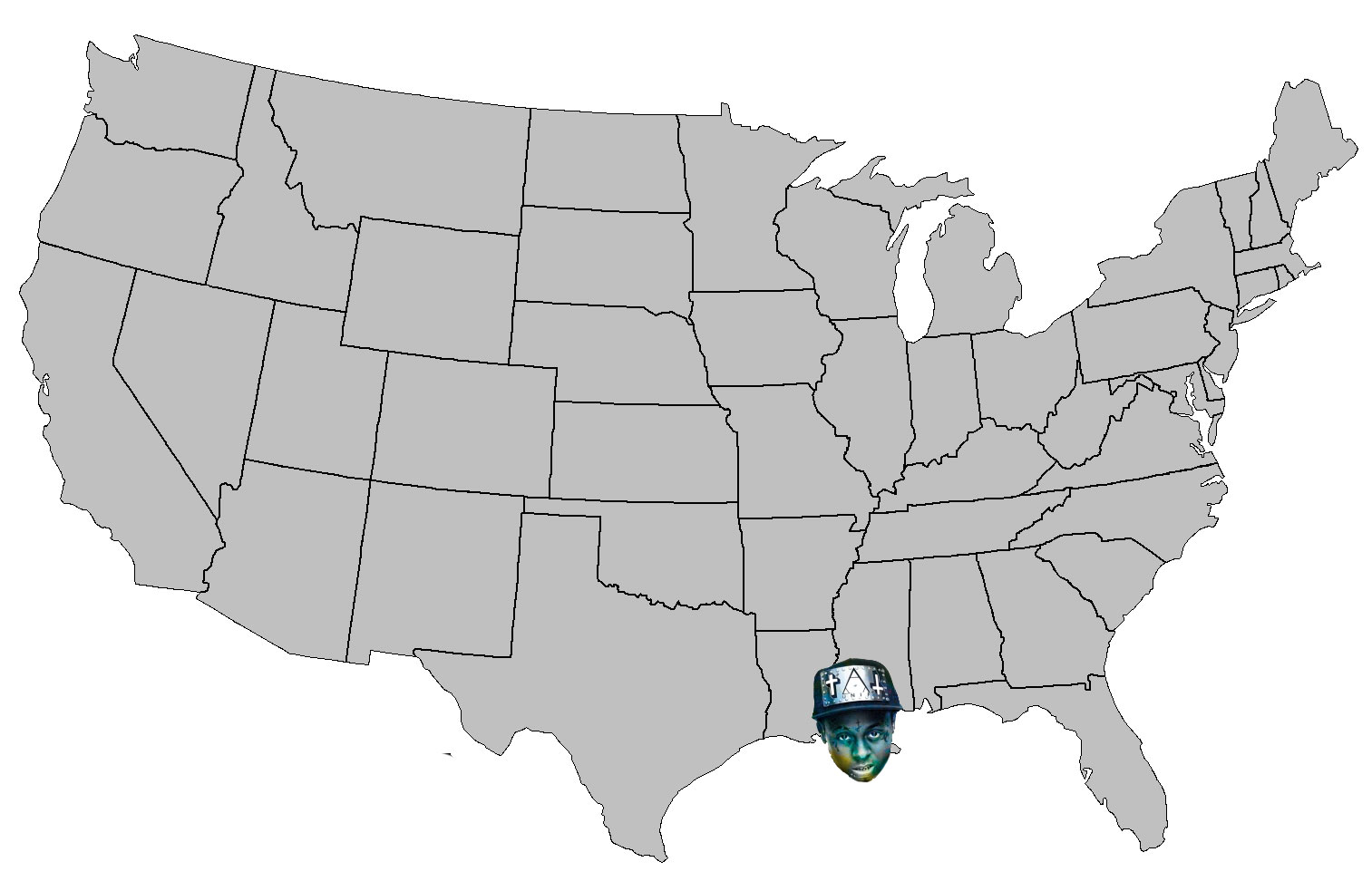Playlist: Rap’s Bottom of the Map

Before Dwayne “Lil Wayne” Carter became the biggest rapper on the planet, he was the biggest rapper in New Orleans—a city steeped in musical tradition and with a rap scene boasting legends both local and national to call its own. Wayne’s fame and his reign have far transcended his Crescent City claims, but rap is built on place as much as on personality, and to understand any great rapper is to understand where they’re from. Here, a quick primer on five artists who laid the foundation for city’s rich rap scene, built its reputation as the home of both gangstas and stylists, and helped raise Lil Wayne as a powerful combination of both.
Master P: “Make ‘Em Say Ugh”
PERCY “MASTER P” MILLER
One of two godfathers of southern gangsta rap (the other being James “Lil J” Prince of Houston’s Rap-A-Lot Records), Percy “Master P” Miller took the West Coast gangsta rap sound he encountered while living in Richmond, California, stripped it down, and brought it home to New Orleans. The result was a bare-bones brew of tough tales and dark beats that gave the South a voice and an antihero to call its own. P then famously flipped the formula into an empire, turning his No Limit Records operation into a Motown-like production that saturated the Southeast and eventually the rest of the nation with a relentless stream of records and artists that defined the sound, look and feel of the region’s rap scene for a generation.
Mystikal: “Shake Ya Ass”
MICHAEL LAWRENCE “MYSTIKAL” TYLER
Famous for his braids and his rapid-fire, tongue-twisting flow, Michael Lawrence “Mystikal” Tyler was a Gulf War vet who made his name on the local, independent scene in the mid-’90s before teaming up Master P’s No Limit Records in 1996. A string of hits followed, both with No Limit and after he left the label in 1999, including a pair of Neptunes-produced tracks, “Danger (Been So Long)” and “Shake Ya Ass” from his album, Let’s Get Ready (released in 2000), which pushed him to pop star status. His work on his 2003 album, Tarantula, earned him a couple of Grammy nominations, but a sexual battery and extortion case derailed his career in 2005.
Juvenile: “Back That Azz Up”
TERIUS “JUVENILE” GRAY
New Orleans’s first breakout rap star not named Master P, Terius “Juvenile” Gray, first began recording in the early ’90s. His early local hit, “Bounce for the Juvenile,” is credited with coining the term “bounce,” which went on to define the New Orleans rap’s signature sound—upbeat records rooted in the city’s Second Line music/party tradition and riding a bed of bass. Already a local star, Juvenile signed to Cash Money Records, and his first independent release with the label, Soulja Rags, is a southern rap classic. It was Juvenile who propelled Cash Money—and, both by extension and directly, Lil Wayne—to national fame. Juvenile’s playful yet seasoned presence anchored the reinvention of Cash Money’s signature group, the Hot Boys, collectively Christopher “B.G.” Dorsey, Tab “Turk” Virgil, Jr., and Lil Wayne, in addition to Juvenile (the group’s original early-’90s lineup dissolved after one of the members was killed), and his sophomore album, 400 Degreez, became the label’s first huge success thanks to the hit singles “Ha” and “Back That Azz Up.” Although he wasn’t on the album version of the song, Lil Wayne (then 16) appeared in the video for “Back That Azz Up,” his first exposure to a national audience.
B.G.: “Cash Money Is an Army”
CHRISTOPHER “B.G.” DORSEY
A local legend, Christopher “B.G.” Dorsey first signed to Cash Money records in 1993, when he was just 13. His stage name is short for Baby Gangsta, and in the early ’90s he recorded an album alongside Lil Wayne—they were in the group The B.G.’z together. B.G.’s unmistakable voice, smelted in a New Orleans accent and dripping with slang, while his young and ruthless persona made him a fan favorite across the Southeast. His huge hit, “Bling, Bling,” from his 1999 album, Chopper City in the Ghetto, made him a rapper on the books—as in the dictionary. In 2003, the Oxford English Dictionary officially added the phrase to mean ostentatious and elaborate jewels or signs of wealth.
Juvenile (feat. Soulja Slim): “Slow Motion”
JAMES “SOULJA SLIM” TAPP, JR.
The one artist on this list who never gained true national fame, James “Soulja Slim” Tapp, Jr., was a fixture of the New Orleans rap scene and, for a time, an artist on Master P’s No Limit Records. His records were rooted in New Orleans street tales, a reflection of the city’s rough reputation in the years before Hurricane Katrina. In 2003, he recorded the song “Slow Motion” with Juvenile. In November of that year, he was murdered in front of his mother’s home. “Slow Motion” was released in March of 2004 and went on to become a No. 1 hit, making Soulja Slim only the sixth artist in Billboard history to have a posthumous release hit No. 1.






